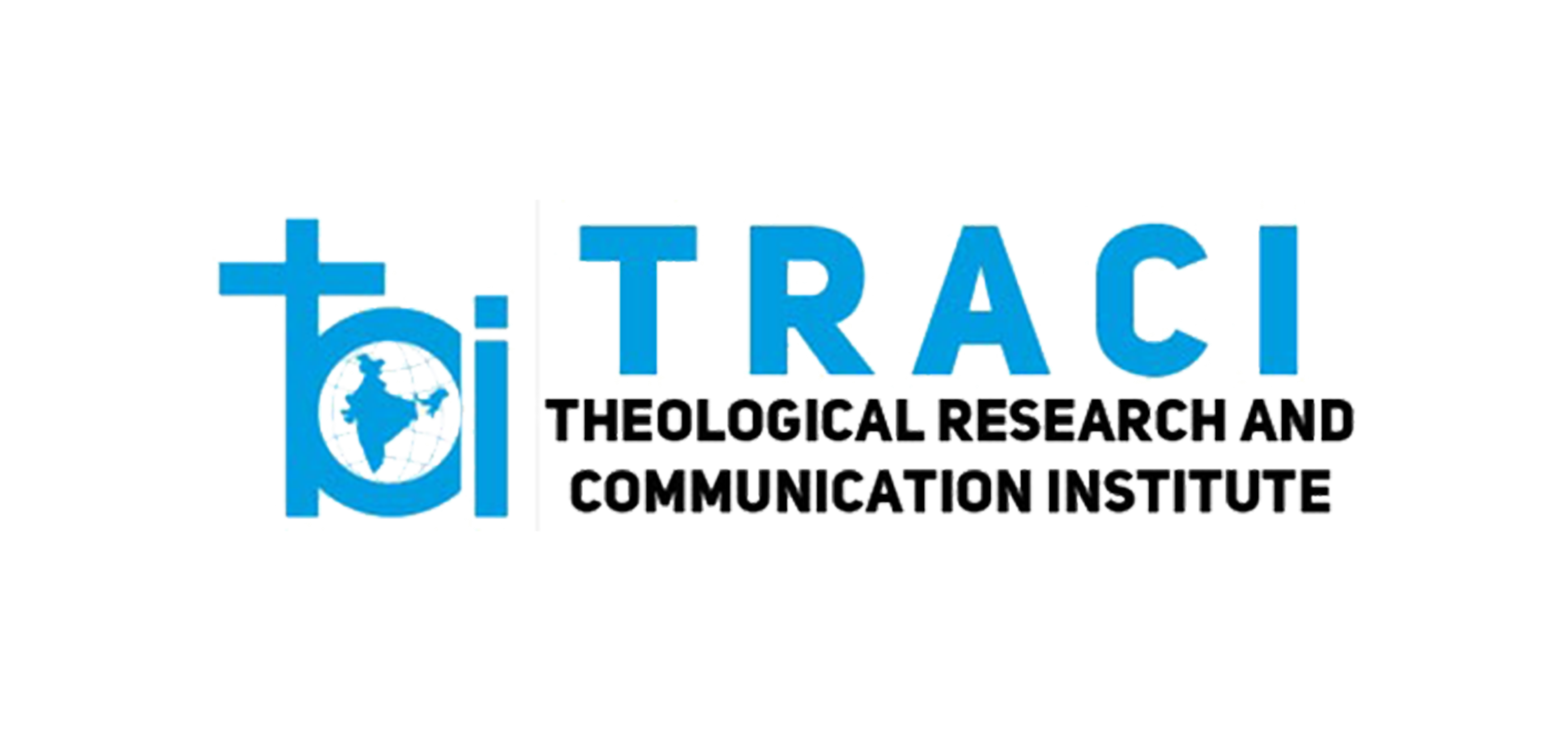TRACI
From the time of its inception in the early Seventies TRACI has been engaged in fostering reflection on contemporary issues with a theological perspective. Various publications including books, journals and papers have been published intermittently. Christian Mind Series was a monthly journal that was published for many years and carried articles with a biblical perspective on the issues pertaining to church and society. In the recent past, TRACI has been organizing a monthly Reflection group meeting in which a specific topic is chosen and a person who has some association or expertise in that particular area is invited to present a paper which is followed by a discussion on the practical application and possible responses to the concerns highlighted in the paper.
The following articles are issues of recent writing and therefore address contemporary issues of our times.


Evangelical Reading of the Cross in the Context of Political Violence
2014 has been a turning point in leading to the spurt of articles, monographs, and discussions related to the topic of political violence[1]. Sections of the society ranging from scholars/academicians, philosophers/intellectuals, politicians, religious heads, and even comedians, have all rendered their views in relation to the context of political violence. This paper intends to take a step back and think through the reality of political violence from a Christian theological point of view.

Whom has education failed during lockdown?
Let me begin with an acknowledgement that this has been a hard time. Everyone is trying to navigate the pandemic and its uninvited challenges the best we can ….this paper will focus on challenges in India’s government school education. What did the lockdown mean for the crores of children enrolled in these schools, that represent the poor and marginalized of our nation? How has 18 months (1.5 years) of school closures and disrupted learning impacted the lives of these children and their families?
Continue reading

Did We Fail Fr. Stan Swamy: Carrying His Legacy Forward
As we reflect on the life and mission of Fr. Stan Swamy, we need to ask what made the life and mission of Stan Swamy a threat to the political elite of the country, especially the ruling establishment? In other words, what made Stan Swamy a prophetic voice that the corridors of power feel the need to silence or eliminate, by branding him a terrorist and an enemy of the State, notwithstanding his advanced age and age-related ailments?
Continue reading

Personal Data for Profit: A Christian Response to Digital Capitalism in the 21st Century
“…We must understand that the process of technological design is an intrinsically social dynamic, not an autonomous or self-directed loop. Innovation does not provide a societal blank check. Nor designs the exclusive prerogative of a few large technology companies (Big Tech). Christians must join in the call for the increased involvement of civil society in the re-design of our digital information ecosystem in order to better serve the purposes of democracy and community building, social life, and human well-being”.
Continue reading

Putting Justice at the Heart of Faith: Reflecting on Ecumenism from an Asian Perspective
This presentation seeks to answer the question, what does it mean to speak of faith and justice from an Asian perspective? What is uniquely Asian about an Asian Faith? And to perhaps reflect on how Asians have imagined faith and contributed to the larger ecumenical discourse. If one were to speak about Asian ecumenism though one would have to first consider what is unique about the Asian continent itself.
Continue reading

Mahatma Phule’s Vision of Balirajya and its Significance for Church and Society
Peshwa Brahmin rule was the cruellest rule in Pune, India where the Peshwa kings implemented the Law of Manu in full effect with severe implications on the ‘Untouchable person’. In the Mughal period, Vedic Brahmins could not only protect their existence but got to deepen its roots and on the other side, Buddhism was destroyed and banished. Bahujans were defeated, dehumanised and reduced to an extremely hopeless condition. ….. A journey through Phule’s life reveals the deep impact that Christianity had on his life both in terms of his thoughts and ideas and also with regard to how he conducted his life in the light of the gospel.
Continue reading

Politics behind the Apolitical Farm Laws
The Government’s move to bring in three ordinances on Farm Laws in Parliament and later getting them formulated into Acts in September 2020 has become a bone of contention for both the Government and farmers. The move lacked wide consultation with the main stakeholders like farmers, implementing states and political consensus, leading to the current unrest in the country with more than 500 farmers’ unions with over 100,000 farmers have gathered on the outskirts of Delhi at Singhu border, Tikkri border and Gazipur border to register their protest.
Continue reading

The Messiah, the Kingdom and Living in Current Times
The present pandemic has not only taken hold of our fears but also of our imaginations!! A welcome development is an increase in social media presence even by groups that earlier shunned it as destructive and counter-productive. .. Beginning with questions on the nature of the virus as the end-time plague, the call to the church to get its act together – to repent and pray – there have been many wild assumptions and predictions too. In contrast, however, what seems to be missing in this imagination over-drive is the reflection on ‘How then should we (the church) respond to the situation, beyond prayer and what should be our engagement? Yes, charitable actions (a relief to those affected by the lockdown)
Continue reading

Understanding Social Devaluation and Wounding through Caste and Gender
The shocking incident of rape and strangulation of a 19-year young Dalit woman in a paddy field in a village of Hathras district … on September 14, 2020, her subsequent death … on September 29th and a hurried cremation in the village field in the early hours of the following day drew much media attention for a few days and led to agitations and protests in various parts of the country. ….The manner in which crucial pieces of evidence to the crime were either neglected during the filing of the report and in the investigation process or later destroyed through the burning of the victim’s body without the presence of her family members clearly reflected the caste bias in dealing with such incidents of sexual assaults on Dalit women.
Continue reading

“In Dark Times: The Hope That Helps”
Hopelessness has pervaded the world since the Fall. The present time is no different. Our country is no different. India achieved freedom and established itself as the largest democracy seventy years ago, but today we watch in horror as gang-rapes and murder occur with impunity and ruling governments use police forces to threaten the weak, control minorities, prevent dissent and suppress the very rule of law that they are required to uphold. … the current social milieu has brought despair to many.
Continue reading

Unbearable lightness of Big Data
There is a high probability you had agreed to a set of terms and conditions that you never read while downloading an app this month. I recently did, with clear knowledge, that whatever I signed up is watching me. .. The technology that structures our day today life is invisible – the GPS, which was once a contraption with visible antennas is now safely hidden inside the toughened glass of your latest android and iOS with microphones that always hears, and cameras that always see. In this digital ecosystem, humanity loses its God-given uniqueness and becomes a sea of data tossed by the government, and mega corporates like Twitter, Facebook, Instagram, amazon, google Microsoft and others.
Continue reading

A Critical Analysis of the National Education Policy 2020
In its simplest sense, policy refers to a broad statement that reflects future goals and aspirations and provides guidelines for carrying out those goals. Our National policy of Education is one such public policy based on the perceived educational needs that the country visualises to address through education. It has come up through a process of deliberation that marks a policy-making process. However, discourses in policy analysis do recognise that the political ideology of the country is the basis on which policy formation takes place as well as the policy is a reflection of the commitment that any country has made to the citizens of the country.
Continue reading

“Contemporary International Relations: Changing Dynamics, Challenges and Responses”
Contemporary international relations (IR) are at an inflexion point in their evolution. In the last few months, they came under immense pressure from a small virus, whose origins are fiercely contested, but its debilitating and destructive implications are felt across the globe. Lives are lost; the global economy is crippled, adversely affecting farmers, labourers, particularly the migrant labourers; education is disrupted, forcing it to go digital in the context of inadequate infrastructure and the lack of financial wherewithal. What this pandemic exposed is the lack of unity and vision among the global leaders in addressing its spread and ramifications.
Continue reading

Biblical Reflections at the Time of Covid -19
The COVID-19 pandemic has been a time of unprecedented global uncertainty for all of humankind with government administrations, healthcare & other essential service providers and humanitarian agencies struggling to mitigate its adverse impact on lives and livelihoods. While there have been many lessons learnt over the last several decades in dealing with disasters like floods, tsunamis, earthquakes, volcanic eruptions, communal & civil strife, droughts and refugee crises – many of which have resulted in huge losses to life and property, COVID-19, because of its geographical reach and speed of transmission has posed an entirely new challenge. Epidemics are not new for humanity
Continue reading

Where Is Jesus When It Is Corona?
Delhi was bloodstained while fighting its battle against communal hatred when the world woke up to this nightmare and realized Coronavirus is here and is here to stay for a while. Suddenly everything seems new, unbelievable and overwhelming. Who would have known visiting your loved ones would no more be an act of love and not hugging and kissing will become expressions of love? When nature reclaimed the earth, humans are to be locked down realizing many things that we considered inevitable in life are trivial. With Corona, the narrative of our race has taken a detour, one we never thought we would take. It now takes a conscious effort to transfer our minds to this new normal. Of the many things that this virus has reminded us, the greatest reminder is that- we are one and the same species… The virus is here to tell us that we human beings share the strongest bond, the bond of being the same species. Ironic as it sounds Corona looks at human beings as God does, as one.
Continue reading

Engaging Faith in a Digital Age
To begin with, Christians have felt that the sacredness of the word is tied to its form and later Christians pondered whether the word of God and the mission of the church were perhaps compromised by changes to that form. We saw similar struggles in explorations of whether the word of God could be conveyed through film and television, in deliberations about the significance and challenges of Bible apps, and in conversations regarding whether the Christian church can be sustained in digital spaces and using various forms of social media. While some Christians are not comfortable with new media, others accept media change without looking at the way that their faith claims and practices will alter in new media ecosystems.
Continue reading

Responses to our Socio-Political Context as Acts of Faith
It is about the faith that is required as we encounter life and its challenges each day. Barring a few exceptions, much of the church teaching encourages a spirituality, which is individualistic, and theology that prioritizes a very inward-looking and self-absorbed journey. While personal salvation and piety are of great importance, such a focus has contributed partially to the neglect of the fact that Biblical narratives evolve from real-life contexts and there are far greater prospects for application than what is generally derived. By and large, we have limited our takeaways from the Scripture. Therefore, it is important for us to ask the following questions. Would our credible responses to the current contexts that we find ourselves in be factored in as faith? Is our faith independent of such underpinnings?
Continue reading

